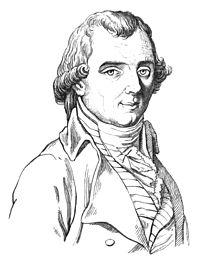Heinrich Wilhelm Matthias Olbers

| 2 Pallas | March 28 1802 |
| 4 Vesta | March 29 1807 |
Heinrich Wilhelm Matthäus Olbers (October 11, 1758–March 2, 1840) was a German astronomer, physician and physicist.
Career
He was born in Arbergen, near Bremen, and studied to be a physician at Göttingen. After his graduation in 1780, he began practicing medicine in Bremen, Germany. At night he dedicated his time to astronomical observation, making the upper story of his home into an observatory. He also devised the first satisfactory method of calculating cometary orbits.
In 1802, Olbers discovered and named the asteroid Pallas. In 1807 he discovered the asteroid Vesta, which he allowed Carl Friedrich Gauss to name. As the word "asteroid" was not yet coined, the literature of the time referred to these minor planets as planets in their own right. He proposed that the asteroid belt, where these objects lay, were the remnants of a planet that had been destroyed. This theory is now discarded by most of the scientific community.
On March 6 1815, Olbers also discovered a periodic comet named after him (formally designated 13P/Olbers).
Olbers was deputed by his fellow-citizens to assist at the baptism of Napoleon II of France on June 9, 1811, and he was a member of the corps legislatif in Paris 1812-1813. He died in Bremen at the age of eighty-one. He was twice married, and one son survived him.
Olbers' paradox, described by him in 1823 (and then reformulated in 1826), is the argument that the darkness of the night sky conflicts with the supposition of an infinite and eternal static universe.
Honors
The following celestial features are named for him:
- 13P/Olbers is a periodic comet.
- Asteroid 1002 Olbersia.
- Olbers crater on the Moon.
- Olbers, a 200km-diameter dark albedo feature on Vesta's surface
References
- Cunningham, C. J. (2006). The Origin of the Asteroids: Olbers versus Regner. Star Lab Press. ISBN 0-9708162-5-1.
- This article incorporates text from a publication now in the public domain: Chisholm, Hugh, ed. (1911). Encyclopædia Britannica (11th ed.). Cambridge University Press.
{{cite encyclopedia}}: Missing or empty|title=(help) - see, for instance, "Olbers," Britannica
